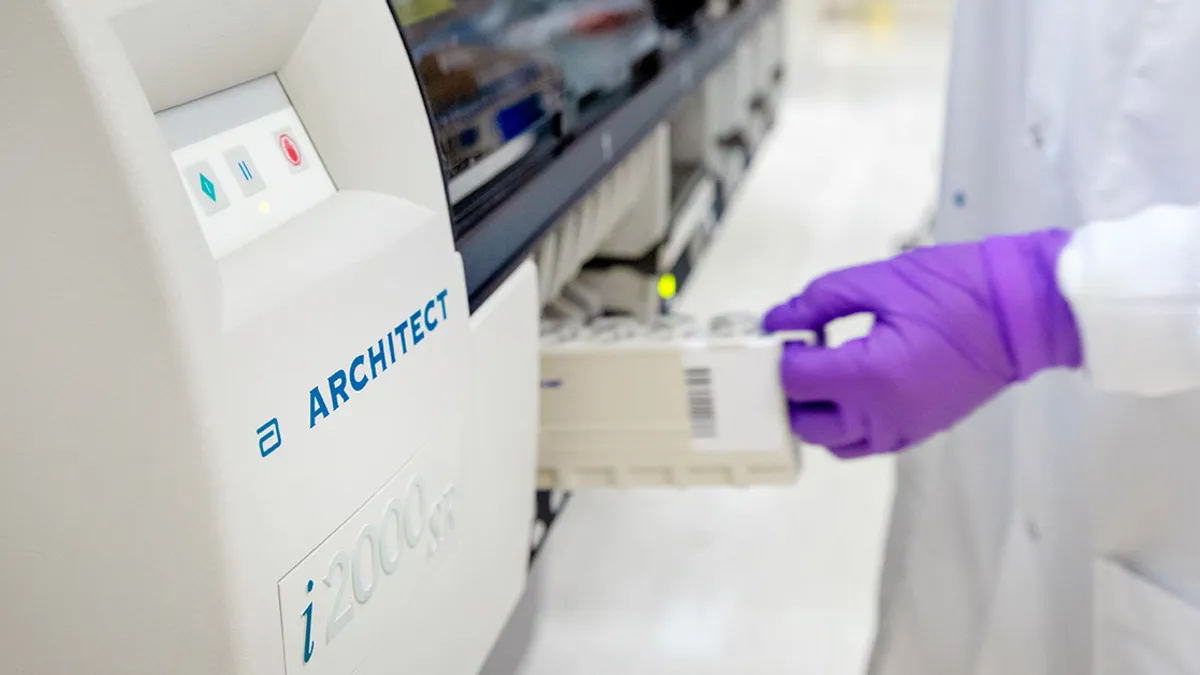Dive Brief:
- Medtech giant Abbott Laboratories reported Thursday worldwide first quarter sales of $7.7 billion, an increase of 2.5% on a reported basis and 4.3% on an organic basis. But citing "uncertainties regarding the duration and impact of the coronavirus pandemic" it pulled its guidance for the year. "We haven't seen a quarter or any time quite like this before," newly minted CEO Robert Ford told investors on an earnings call.
- Abbott has launched three COVID-19 tests: a rapid molecular test that runs on a point-of-care device, a test that runs on its high-throughput m2000 system, and an antibody test launched Wednesday that has begun shipping. However, because the first two diagnostic didn't get emergency use authorization from FDA until late March, Ford said: "We actually didn't have a lot of COVID test sales" in the first quarter and the company sees "more significant" potential in the second quarter.
- Nonetheless, the Trump administration last week charged that many of Abbott's high-throughput machines are not being used anywhere near full capacity. In addition, the company's point-of-care tests are not yet widely available. "We have a lot of m2000s in the country but we also began shipping them to some pretty difficult areas," noted Ford. "We've delivered everything that we said we were going to deliver. Obviously, that is not enough. We still need to do more."
Dive Insight:
On Ford's first earnings call as CEO, he painted a picture of mixed results in the first quarter.
Worldwide medical device sales increased 1.4% on a reported basis and increased 2.9% on an organic basis but growth in both cardiovascular and neuromodulation businesses were negatively impacted by reduced procedure volumes due to the coronavirus pandemic.
At the same time, worldwide diagnostics sales decreased 0.8% on a reported basis and increased 0.7% on an organic basis, with core laboratory diagnostics sales growth negatively impacted by lower routine testing volumes due to COVID-19. "It was definitely an intense first quarter here for our diagnostic business even though it doesn't look like that in the sales number," Ford said.
He recounted how starting in February as China first began quarantine and other restrictions, Abbott saw big drops there in heart device procedures as well as in routine diagnostic testing volumes.
In March, Ford said the company saw similar impacts to its businesses in Europe and the U.S. "While we haven't seen a rebound, we're starting to see some signs of stabilization," Ford added.
Looking forward, Ford said Abbott is advancing its product pipeline, including in its structural heart business. He pointed to recent CE marks for several cardiovascular devices including TriClip, which the company contends is the world's first minimally invasive device for repairing a leaky tricuspid heart valve.
In addition, Abbott picked up a CE mark for its transcatheter mitral valve replacement device, Tendyne, at the start of the year, and is also targeting U.S. approval of its transcatheter aortic valve replacement product, Portico.
Ford also mentioned that the company in February received a CE mark for the Gallant implantable cardioverter defibrillator and cardiac resynchronization therapy defibrillator devices to help manage heart rhythm disorders.











